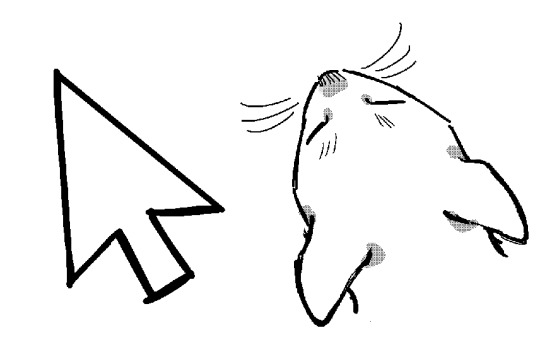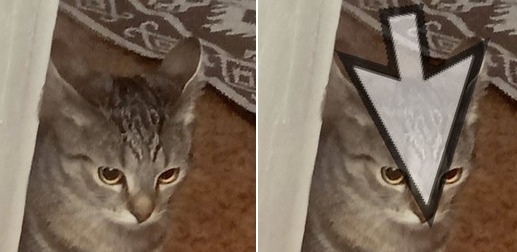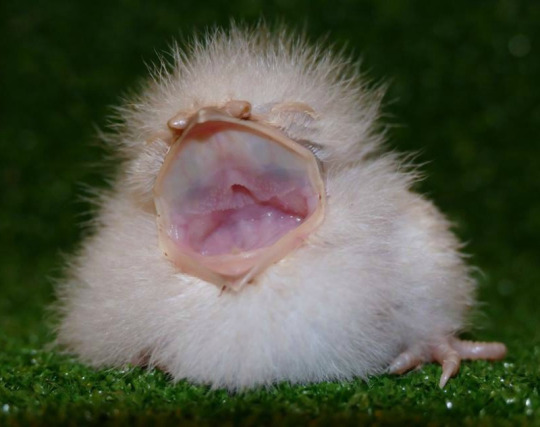Photo

the special relationship is as strong as ever, lads
216K notes
·
View notes
Text
I think a lot about how our culture almost exclusively anthropomorphizes jellyfish as if the outside center of the bell is the “top of their head,” like this:

But…..if we think of an animal’s “front” as the direction it moves in, and we factor in that MANY jellyfish (not just box jellies, either) have eyes or at least simple light-sensitive eyespots all the way around the rim of the bell, then the “face” of a jellyfish would actually be this:

Conversely, if you think of an animal’s face as wherever its “mouth” points, or at least wherever food goes in, then the visual characterization of a jellyfish should be more like this:

16K notes
·
View notes
Photo

when cats put their ears back they become cursors

116K notes
·
View notes
Text
reverse gaslighting where i pretend to know exactly what you are talking about
390K notes
·
View notes
Text
🪓 returning-videotapes Follow

New carrd. What do you think?

👨💼 mcdermmot Follow
Whoa. Very nice. Take a look.

🪓 returning-videotapes Follow
Added my BYF yesterday.

📈 van-patten Follow
Good coloring.

🪓 returning-videotapes Follow
That's bone. And the lettering is something called Silian Rail.

📈 van-patten Follow
It is very cool, Bateman. But that's nothing.

Look at this.

💼 bryce-isright Follow
That's really nice.

📈 van-patten Follow
Eggshell with Romalian type. What do you think?

🪓 returning-videotapes Follow
Nice.
36K notes
·
View notes
Text
🪓 returning-videotapes Follow

New carrd. What do you think?

👨💼 mcdermmot Follow
Whoa. Very nice. Take a look.

🪓 returning-videotapes Follow
Added my BYF yesterday.

📈 van-patten Follow
Good coloring.

🪓 returning-videotapes Follow
That's bone. And the lettering is something called Silian Rail.

📈 van-patten Follow
It is very cool, Bateman. But that's nothing.

Look at this.

💼 bryce-isright Follow
That's really nice.

📈 van-patten Follow
Eggshell with Romalian type. What do you think?

🪓 returning-videotapes Follow
Nice.
36K notes
·
View notes
Text
MBTI TYPES AS BOOK QUOTES
3. Edgar Allen Poe's poems
ENFJ: Sleep, those little slices of death — how I loathe them.
ENFP: I became insane, with long intervals of horrible sanity.
INFJ: And so being young and dipped in folly I fell in love with melancholy.
INFP: All that we see or seem is but a dream within a dream.
ENTJ: Never to suffer would never to have been blessed.
ENTP: Deep into that darkness peering, long I stood there, wondering, fearing, doubting, dreaming dreams no mortal ever dared to dream before.
INTJ: Leave my loneliness unbroken.
INTP: From childhood's hour I have not been as others were. I have not seen as others saw. I could not awaken my heart to joy at the same tone. And all I loved, I loved alone.
ESFJ: "That is another of your odd notions," said the Prefect, who had a fashion of calling everything "odd" that was beyond his comprehension, and thus lived amid an absolute legion of "oddities".
ESFP: You call it hope — that fire of fire! It is but agony of desire.
ISFJ: Convinced myself, I seek not to convince.
ISFP: I was never really insane except upon occasions when my heart was touched.
ESTJ: I intend to put up with nothing that I can put down.
ESTP: To die laughing must be the most glorious of all glorious deaths!
ISTJ: If you wish to forget anything on the spot, make a note that this thing is to be remembered.
ISTP: Believe nothing you hear, and only one half that you see.
3K notes
·
View notes
Text
Perfectionism is a pain in the neck...but it's especially bad for NJs.
Perfectionism is a bitch. People have difficulties when they have a picture of a flawless future that will never come to be, and they have difficulties when their vision is out of touch with reality. NJs are the most prone to develop into perfectionists, and they are the ones that suffer the most as a result of the lengths to which they will go in order to attain their ideals.
Perfectionism is a compulsion that has to be satisfied in order to be happy. It is a strong want that is prompted by unconscious emotional reactivity, which might include things like: deep-seated concerns, insecurities, painful memories, unresolved trauma, defensive systems, and so on. It is a powerful urge that is motivated by unconscious emotional reactivity. Humans are generally apprehensive about immediately identifying and confronting unconscious activity since it produces unpleasant sensations and has the potential to harm one’s self-esteem; as a result, humans are emotionally driven to conceal unconscious activity. However, the more one attempts to repress or deny such behavior, the “louder” it becomes, until one is driven to succumb to dark emotional forces that are overwhelming him or her.
In general, Intuitive people are more likely to be perfectionists than Sensor people. A person’s innate ability to accept and honor facts, as well as the ability to change one’s expectations in accordance with reality, naturally serves to protect them against acquiring perfectionist tendencies. To argue that Sensors cannot be perfectionists is not to say that they cannot; it simply means that they are less likely. Because intuitives are generally unsatisfied with reality, they refuse to accept facts that limit their imagination, and they are less flexible to unexpected reality checks than other types of personalities. Because they have placed a high value on fulfilling their ambitions, dreams, or ideals, they are more prone to engage in perfectionist conduct in order to force reality to conform to the visions that they have in their heads. To put it another way, a dysfunctional N function is frequently the root cause of perfectionist tendencies. Because everyone possesses a N function, everyone is capable of perfectionism when the conditions are favorable. According to the health and development of the N function, as well as its position within the functional stack, perfectionism manifests itself in a variety of ways.
When one’s Ni perceptions are too limited, too inflexible, too poorly defined, or too severe and detached from reality, it is very likely that Ni types will engage in self-destructive conduct, regardless of where they are in the functional stack. One must understand the difference between perception and reality in order to properly use Ni: 1) one must understand the difference between perception and reality, 2) one must be willing to examine the truthfulness of one’s perceptions about the world, and 3) one must be able to step back from negative events in order to put them into a larger or longer-term perspective. Consequently, when Ni is used inappropriately, one frequently treats their twisted perceptions as absolute truth, 2) one becomes lost in the hope that ideal visions come true, and 3) one is easily led astray by the trivial and the negative due to a lack of big picture or long term perspective, among other things.
Individuals who are unable to use Ni maturely frequently experience hair-trigger frustration, and if they are unable to find a healthy outlet for their negative emotions, they are more likely to use Se to vent their frustrations into the outside world. Unhealthy Se behavior can manifest itself in a variety of ways, including emotional overreactions, impulsive overcompensation for negative events/setbacks, unreasonable demands and expectations, aggressive and controlling behavior, an insufferably whiny and self-pitying attitude, arguing pointlessly about which “facts” are true/false, discriminately selecting “evidence” to support/prove controversial ideas, and wasting time redoing tasks in order to perform them flawlessly, Of course, this type of behavior is not helpful to flourishing and reaching one’s positive potential in any way. When Ni types’ perceptions become distorted or extreme, or when Ni types have difficulty setting healthy ideals to guide them towards positive self-actualization, it is likely that they will eventually suffer from depression or cynicism because they will see nothing in the world that is worth committing themselves to or investing their time and energy into.
The development of auxiliary Fe in immature INFJs is typically hampered, which means that they have difficulties blending in and creating emotional intimacy with others. As a result, they experience the loneliness and misery that comes with not having a strong social support system. Perfectionism in INFJs sometimes manifests itself in the form of self-flagellation and the attempt to twist oneself into a false image of perfection in order to avoid fitting in by finding solace in becoming whatever notion of perfection one believes is necessary for feeling self-confident. They will, however, lose touch with their authentic selves and their own emotional needs the more they strive to be a false image of perfection as a means of building fake self-esteem (rather than addressing the underlying issue of emotional insecurities or social anxieties), to the point where they will feel completely lost in life and will have no idea why.
In its most basic form, Ni perfectionism is a misalignment between what one wishes the world to be (Ni) and what the world actually is (Se). When Ni and Se are out of balance, Ni types only see what appears to be lacking; they perceive imperfections, falsehoods, gaps, and voids, and they hyper-focus on those things, unable to visualize, let alone successfully implement, meaningful positive potential. When Ni and Se are out of balance, Ni types only see what appears to be lacking; they sense imperfections, falsehoods, gaps, and voids, and they hyperfocus on those things. The best way to deal with Ni perfectionism is to get one’s expectations and reality more in line with each other. You are under no responsibility to have your expectations met by the world; rather, if you are serious about leading a fulfilling life, you must learn to adjust your expectations in accordance with the realities of the outside world. It is not healthy to set unrealistically high or far-reaching goals, nor is it healthy to set unrealistically low or no goals at all.
In reality, an ideal is simply a concept that provides direction, and progress should be made progressively by implementing realistic plans and learning from setbacks. However, fixating too much on the destination means that you miss out on either the enjoyment of the journey itself or the opportunity to discover other, more interesting paths. Keep in mind that the rigid way you define “perfection” does not reflect the truth of the universe or how it should be in the first place. How can you ever learn, feel, experience, and appreciate everything that life has to offer if you doggedly hang on to flawed concepts and ideals despite the bad outcomes and implications? Given that the meaning of life is a subjective fabrication, rather than an abstract idea, it may be altered at whim at any time. However, this cannot be accomplished when one wishes to believe in comfortable falsehoods and close one’s mind to other viable interpretations.
Working on improving your emotional intelligence is the first step in overcoming perfectionism since it makes your perfectionist behavior and its emotional roots more apparent. <3
4 notes
·
View notes
































